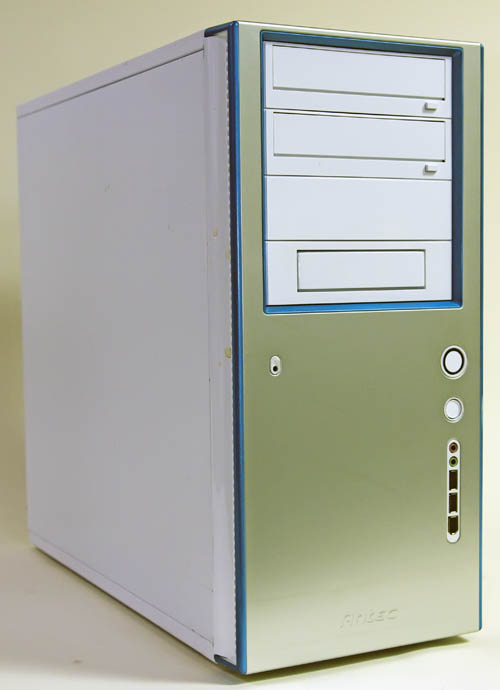Loyd's New Year - A Trio of Problem Systems
by Loyd Case on January 13, 2010 12:00 AM EST- Posted in
- Systems
It’s the new year, which must mean it’s time for all our PCs to go belly up.
Or so it seemed to me in the past couple of weeks. I thought the tale of these three systems is worth telling, as a lesson in recognizing and solving different types of PC problems. Perhaps you’ll see something of your own PC troubles in this, but even if you don’t, there are still lessons to be learned.
We’ll begin this with the story of my daughter’s ever-slowing Vista system.
The Tale of the Clogged PC
This past weekend, I’d decided it was time to nuke my daughter’s system from orbit. It was the only way to be sure.

Emily’s been running a fairly decent, though not bleeding edge system. Core components include an Intel QX6850, Asus P5Q3 Deluxe motherboard and an older 512MB Radeon HD 4870. Over the past couple of months, the system had begun running slower than molasses.
Emily is a fairly typical teenage girl when it comes to PC use. She uses the web heavily, and happily downloads anything she thinks she might like. She is, however, more tech savvy than most teenage girls, so she doesn’t do really stupid stuff, like open phishing emails. However, she’s a happy user of WildTangent games, likes to have the Weather Channel bug running (ugh, I say), and related sorts of gimmickry that can act as brakes on a fast system.
Recently, though, her system had been really dragging – so much so, that she’d given up on using it, and was using the communal living room laptop to do her homework and even run some light games. (I confess: I got her hooked on Torchlight.)
It all began several months back, when Emily began complaining that her system was glitchy. At the time, it was running Windows XP. I’d built the system about eighteen months ago, and it had been running reasonably well. I’d never been entirely happy with the QX6850, though. Even with a beefy Scythe Ninja cooler, the CPU typically idled at 58 degrees C. The QX6850 ran at 3GHz, but was built with the same 65nm process technology used in the original Conroe CPUs.
So I did something that, in retrospect, planted the seeds of bigger problems to come: I thought it would be a good idea to perform an in-place upgrade from Windows XP to Windows Vista.










109 Comments
View All Comments
deimos3428 - Wednesday, January 13, 2010 - link
Throwing hardware at a performance issue only buys time.Zelog - Wednesday, January 13, 2010 - link
That's what she said.TinksMeOff - Wednesday, January 13, 2010 - link
As a computer tech for over two decades I found this article rather refreshing to hear from a site such as Anandtech.com. You may wish to note as well that 'different parts' don't mean better parts. Under manufacture warranties, techs replace RAM, MB, CPU, GPU and HD's with the exact same parts. They just overheat, wear out or whatever and go bad over time. I not saying don't look for a better quality part, just check your warranties and get it replaced with the same parts with very little overhead (shipping & time usually).Of course, most people will not have extra parts to experiment with as your article mentions.
ciparis - Wednesday, January 13, 2010 - link
Nice article, Loyd! Good to have you here and away from all those PC magazines you've been writing for for so many years :)I had the original version of that P6T -- just sold that system after over a year of rock-solid stability. Good choice.
blyndy - Wednesday, January 13, 2010 - link
Loyd, for future reference, if your PC is running 'slow as molasses' in a loosely controlled software environment you should suspect software foremost, not hardware.Sadly, you could have confirmed or confuted that possibility simply by swapping in a spare drive (or ghosting) and doing a clean install and comparing performance.
If performance was still slow then suspect hardware.
vol7ron - Wednesday, January 13, 2010 - link
I agree.Regarding your daughter's computer:
Instead of doing a clean install, I think you should have tested the problem out a little bit - it might have been worthwhile to your readers.
1) I would like to know if the Device Manager was showing everything as connected and running properly (for all the problems)
2) I would have liked to see you get a Registry Mechanic, or some other sort of registry cleaner.
3) I would also like to know if you ran a scandisk or disk defragmenter. Often fragments cause problems.
4) I would like to know if you had any problems in safe-mode. Safe-mode is a good indicator of solvable problems. (as with running Hijack-This).
-----------------
With regards to the other problems, I am also curious if this could have been due to some "Win Rot". I would have liked to see some fresh installs before determining it was purely hardware.
loydcase - Wednesday, January 13, 2010 - link
Well, your point was embedded in my "lessons learned". Changing too many variables when trying to troubleshoot a problem sometimes mean you don't actually track down the real cause... or waste time until you do.OCedHrt - Wednesday, January 13, 2010 - link
Sometimes it is simply faster to start over than to find the problem :)Also, the not always posting in the last one can very well be a PSU issue where it can't provide enough amps for cold boot when warm.
smn198 - Wednesday, January 13, 2010 - link
Hindsight is always 20:20!